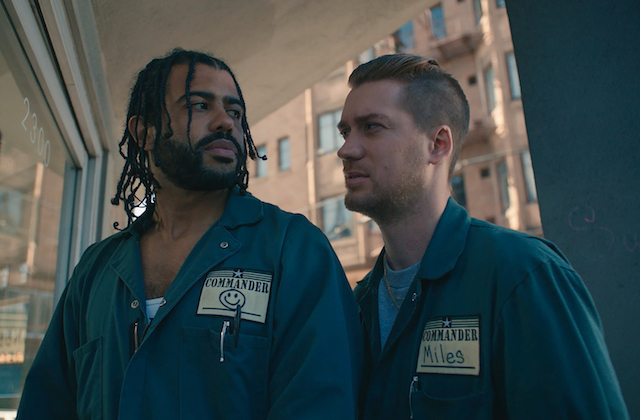Watching "Blindspotting" feels like an immersion in all things Oakland. The scenes of detached rowhouses abutting new condos, residents using hella local slang and voicing resentment toward new wealth—all underscored by infectious hyphy beats—illustrate a city where gentrification threatens Black residents and the culture they created. Daveed Diggs ("Hamilton") says that he and Rafael Casal ("Ricochet in Reverse") built those ideas into their film from the beginning.
"We decided it should be about the Bay Area and Oakland specifically, because we’d never seen it done in the way that we always imagined it to be, and that it should star us," Diggs tells Colorlines. "Right about that time, Oscar Grant was killed at Fruitvale BART Station. In telling an Oakland story, that was a part of the story we were telling."
A White policeman killing an unarmed Black man is one of several ways that "Blindspotting" incorporates criminal justice themes. Diggs stars as Collin, a formerly incarcerated man trying to survive his last days of probation while working at a moving company with his White best friend, the impulsive Miles (portrayed by Casal). His relative stability falls to pieces when he sees the shooting. He lives with the trauma of what he saw while trying to prevent Miles from causing trouble, which puts them on a collision course that could threaten Collin’s freedom.
"Miles is a composite of a lot of people we know," Casal says of his character. "He’s a complicated character, in the same way that Collin is. We wanted to show the complexity of the kinds of characters that are in flux in Oakland, at the heightened moment: in the midst of gentrification, police tension with Black and Brown bodies, a massive economic divide and a vanishing middle class."
Diggs and Casal also drew on their experiences as spoken-word poets and rappers while writing the script. The film features verses about the changing fortunes and central struggles at play. "That’s what we knew how to do well earliest," Casal says about the verse aspects. "The heightened language is a mechanism for communicating complicated, and sometimes hard, ideas to discuss in ways that are more digestible and entertaining to the ear."
Diggs adds that the film’s title, which comes from a scene in which Collin’s supervisor and ex-girlfriend Val ("True Blood" star Janina Gavankar) discusses the Rubin’s Vase illusion, similarly distills a core message. "It’s a relatively complicated thing about all of your experiences cultivating what you’re going to see or not see in any given situation," Diggs explains. "In [Val] doing that, she created an apt summation of many things going on in the film. We’re never trying to prescribe what people should take away from ‘Blindspotting,’ but it certainly advocates a kind of active empathy: an understanding that you’re conditioned not to see something, but you can see it if you’re willing to do the work."
"Blindspotting" opens in select cities today (July 20), and nationwide on July 27.
